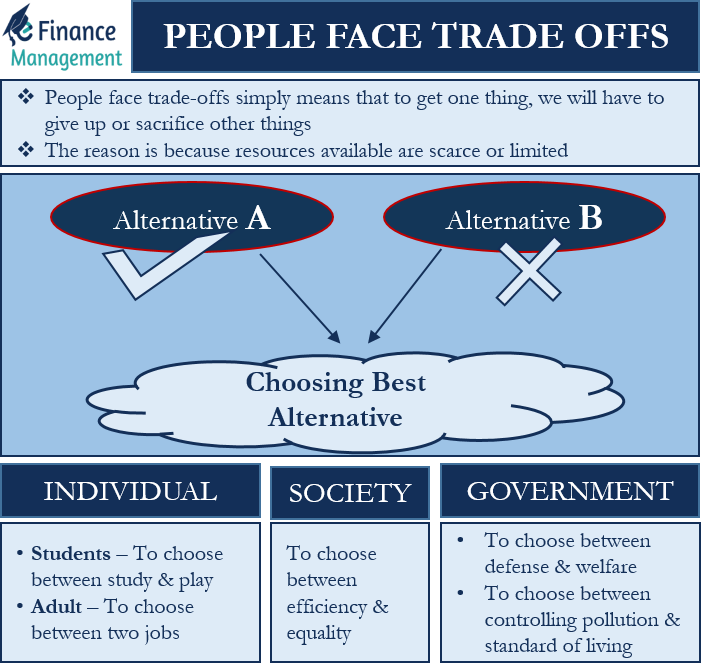What is Principle 1: People face Trade-offs?
Eminent macroeconomist N. Gregory Mankiw gave us ten principles of economics in his book “Principles of Economics.” The first four principles focus on the decision-making of individuals in an economy. The first principle states that people face trade-offs which simply means that to get a thing A, we will have to give up or sacrifice other things B, C, or D. We have to make a decision to choose one alternative out of the many alternatives available to us. If there is no other alternative for a choice, there will be no trade-off.
Why can we not have it all rather than choosing only one or a few alternatives? This is because the resources available to us are scarce or limited. The common resources include land, labor, capital, and enterprise. Hence, we have to judicially use these scarce resources in the best possible manner by choosing the best possible alternative. The alternative that we choose should maximize the utility that we derive from our choice.
What are Trade-offs?
As discussed above, trade-offs involve decision-making to choose the best available option from the many options. Trade-offs apply to individuals, groups, and even organizations and governments. Trade-offs involve opportunity costs. Choosing one alternative over another results in a loss by giving up the other available alternatives.
There is no measurement for trade-offs. It is relative in nature. Also, one crucial characteristic of trade-offs is that even the richest of people face them. A poor man having $100 to spend may face a trade-off between choosing food or shelter for living. The world’s richest man Elon Musk may face a trade-off between buying a yacht or spending that money to buy another company. Hence, trade-offs are omnipresent.
Also Read: Ten Principles of Economics
Individuals
People face trade-offs on a regular basis in their day-to-day lives. Students face a trade-off between the choice of studying, playing, or going out for a movie with friends. The cost of choosing to play is missed with the opportunity to study or go out for the movie.
Similarly, grown-ups face a trade-off between choosing one job or work over the other. A manufacturer has the option of producing various products. He has to make a choice to produce one or a few out of the many options. Service providers face a trade-off between choosing the best service alternative to provide.

Society and Government
Societies and governments face several trade-offs but on a higher level. Governments constantly face the “guns and butter” trade-off. Resources such as capital and manpower are scarce even with the government. It has to choose and balance its expenditure between defense and public welfare. The more it spends on one of them, the budget for the other will go down.
Governments face the trade-off between controlling pollution and the standard of living as well. Strict laws for pollution control often result in higher costs of production as well as low productivity. If the producers pass on these costs to the consumers, they will have to pay more for their purchases. This will result in higher expenditure and lower savings. If the producers bear the higher cost themselves, their profits will shrink, resulting in lower incomes. Moreover, they will pay lower salaries and wages, affecting the income levels of people working under them. Thus, the trade-off for implementing strict pollution controls lowers the standard of living for the people.
Also Read: Principle 4: People Respond to Incentives
A trade-off between efficiency and equality is another problem area that societies face—deriving the utmost benefits from the scarce resources available results in efficiency in society. However, when the government attempts to promote societal equality, it may promote inefficiencies—higher taxes on individuals dents their motivation to work hard and earn more. Freebies and subsidies on goods and services for the poor also take the motivation away from them to work hard. They are getting help from the government without working. Hence, the trade-off of ensuring equality in society may be the promotion of inefficiency.
Summary: People face Trade-offs
People face trade-offs in each and every facet of life. The success of individuals and society as a whole depends upon the quality of their decision-making. We should acknowledge that we have to let go of some alternatives and choose the best one. We should always consider the opportunity cost of our decision. Our choice should result in the optimum utilization of the resources and help us to achieve maximum possible satisfaction or benefit.

